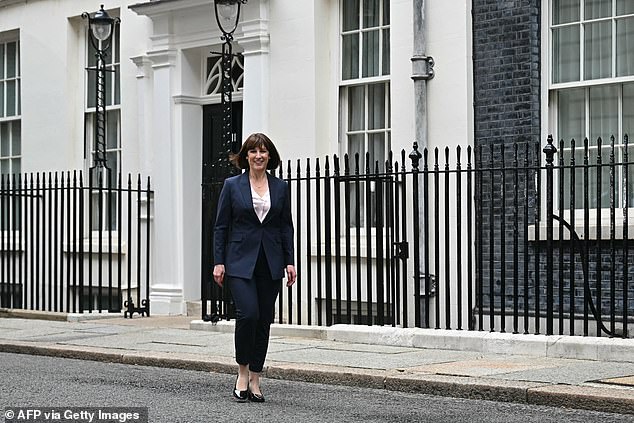Table of Contents
Rachel Reeves will present her first budget this week, in which she is expected to announce sweeping tax rises.
The Government has said the tax burden will fall on those with broader shoulders, and many people are understandably worried about what this could mean for their money.
Making rash decisions based on speculation is not recommended, and financial experts urge people not to panic and do something they may later regret.
However, there are some simple things you could still consider to protect some of your cash from a tax grab.
We look at the possible changes ahead and some of the adjustments you can make ahead of the fall budget.
Go over budget: Reeves expected to conduct tax raid on investments and property
Use your tax-free allowances
Reeves is widely expected to carry out a capital gains tax raid to boost the Treasury coffers, having repeatedly ruled out a rate hike during the election.
CGT applies to profits made from selling investments, second properties, business assets and personal possessions worth more than £6,000, and profits above the annual tax-free allowance of £3,000 all fall within the tax net.
The rate someone pays depends on whether they are a basic, higher or additional rate taxpayer, and the type of assets they are selling.
However, in most cases, CGT rates are lower than income tax rates, making them a prime target for an increase.
Basic rate taxpayers with taxable income of less than £50,270 generally pay capital gains tax of 10 per cent, while higher and additional rate taxpayers pay 20 per cent.
But rates are different on properties that aren’t your own home. Second home and buy-to-let gains face capital gains tax rates of 18 per cent for basic rate taxpayers and 24 per cent for higher and additional rate taxpayers (the latter rate was reduced from 28 per cent). cent from April 2024). ).
It is unclear whether Reeves will reduce the tax-free allowance, currently £3,000, or increase headline rates, which is more likely.
This means you could end up paying more taxes on your investments or second properties.
If you think you might be affected by a CGT raid, the first thing you should do is make sure you are using all the tax-free reliefs available to you.
If you have investments, make sure you have used all of your £3,000 tax-free CGT allowance, as well as your annual Isa allowance limit.
Isas allow savers to save up to £20,000 each year tax-free, meaning they can avoid paying tax on any gains made.
Gary Smith, financial planning partner at Evelyn Partners, said: “Higher CGT rates should focus everyone’s attention firstly on the importance of tax wrappers such as Isas and pensions, which protect investments from taxes on both capital gains and dividends, and secondly, in the use of annual taxes.” tax-exempt allowances.
“This is especially important if you are married or in a civil partnership and can take advantage of both sets of reliefs and transfer savings and investments so they do not attract unnecessary tax liabilities.”
Shared allowance between spouses
You can also mitigate some of the impact of higher CGT rates by transferring some of your shares to a spouse or common-law partner.
A couple can use their two CGT allowances jointly, giving them a limit of £6,000. If you are in different tax brackets, any profits above the zero rate band can be made by the lower rate taxpayer. This helps reduce your overall CGT bill.
It is worth remembering that once you have transferred the shares, your spouse or partner becomes the full owner of the investments.

Sharing the burden: Married couples or those forming a civil partnership can take advantage of joint capital gains tax relief, shielding up to £6,000 in gains from tax.
Charlene Young, pensions and savings expert at AJ Bell, says: ‘Any investments transferred to your spouse or civil partner are exempt from capital gains tax.
‘This means that if your spouse hasn’t used up their tax-free allowance this year and has some Isa allowance left, they can make use of those tax breaks.
‘You just need to make sure you write down the original cost of the asset, as that is what will be used when your partner comes to sell it.
“If your spouse is in the basic income tax bracket but you are a higher or additional rate taxpayer, there is a double benefit as the current rules mean they will pay capital gains tax at a lower rate “.
bed and isa
It’s always a good idea to make sure you put money into an Isa and don’t pay more tax than necessary, regardless of your budget.
You can move your shares into an Isa by doing something called a ‘bed and Isa’, where shares are sold and then bought back from within the Isa.
You shouldn’t feel pressured to make a mistake that could do more harm than good.
However, you should be aware that this may result in a CGT charge if the profit exceeds the £3,000 allowance.
You can also transfer the shares to your spouse if you are a lower rate taxpayer and then sell and buy back the shares.
However, you should also be aware that the Government could introduce a limit on money saved in Isas. While there is an annual Isa allowance of £20,000, there is currently no limit on the amount of money savers can accumulate in an Isa over their lifetime.
But there has been speculation that Labor could introduce a lifetime limit of £500,000, which could pose problems for those on larger pots.
They could also reduce the annual Isa allowance of £20,000 by £5,000, meaning less of your money will fall into the tax-free wrapper each year.
Reeves will not be making any changes to the tax-free wrapper on Wednesday and instead changes are likely to be made next April, giving savers some time to come up with a plan of action.
Give a present
If you’re looking to protect your money in other ways, you can always gift some of your savings to a family member.
You can currently donate up to £3,000, which is included in your annual giving allowance, but you can also donate larger sums under a system called potentially exempt transfers (PET).
These will be left out of your estate after seven years, as long as you do not die within that period, a rule put in place to prevent people from avoiding inheritance tax by giving away large sums of money in old age.

Generous giving: If you’re willing to give money to friends or family, it could help reduce your tax burden, but there are rules about this that you should know.
There is currently no limit on the amount you can donate as a PET, but it will only be exempt from inheritance tax if you survive for seven years after it is made.
Hargreaves Lansdown says more than one in seven of its clients said they had been prompted to give money to their family.
However, there is speculation that Labor could change the rules and extend the number of years from seven to ten, making it more difficult to transfer your money.
This means that if you are considering donating some of your savings to reduce inheritance tax, it may be best to do so as soon as possible.
But you shouldn’t necessarily worry unless the inheritance tax could become an issue for your beneficiaries.
It must be worth £325,000 if you are single, or £650,000 jointly if you are married or in a civil partnership, for your loved ones to have to pay death tax.
And there is another important allowance, known as the nil residence rate band, which increases the threshold to a combined £1m if you have a partner, own property and intend to leave money to your direct descendants.
Don’t panic
Reeves is likely to make some broad changes that could cause more of his cash to fall under taxes.
But when making changes to your finances, the most important thing is to think long term and not make hasty decisions.
Fidelity’s Emma Simon says: ‘It’s never a good idea to make significant changes to your investments based on budget speculation. This rarely equates to sound financial planning.
‘However, it’s always worth reviewing your finances regularly to make sure you’re making the most of all tax relief.
“This includes protecting savings and investments in tax-free wrappers such as Isas and pensions.”
It’s important to note that while speculation has reached a fever pitch, we still don’t know what Reeves will announce in the budget.
We also don’t know when changes are likely to be enacted. It could be that she makes the changes immediately, to avoid a flood of people selling their assets.
Or you may have to wait until the next fiscal year, which begins next April, which would give you more time to consider any changes you want to make, if any.
Hargreaves Lansdown says: “Not every last-minute move is a good idea… While smart last-minute moves could leave you substantially better off, you shouldn’t feel rushed into making a mistake that could do more harm than good.”
Some links in this article may be affiliate links. If you click on them, we may earn a small commission. That helps us fund This Is Money and keep it free to use. We do not write articles to promote products. We do not allow any commercial relationship to affect our editorial independence.

